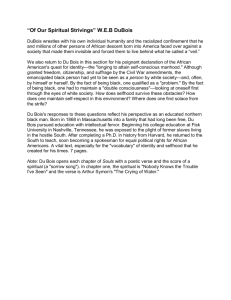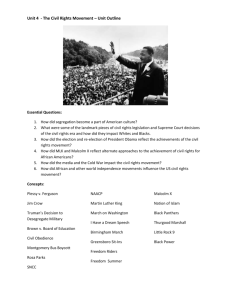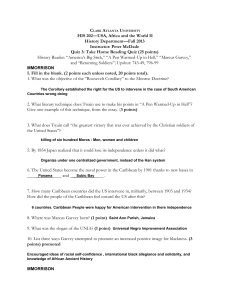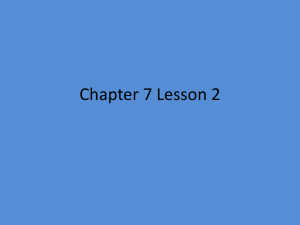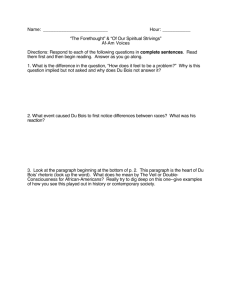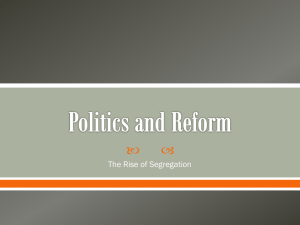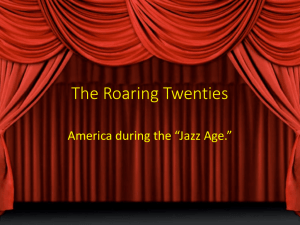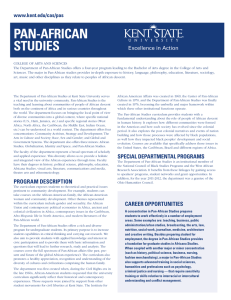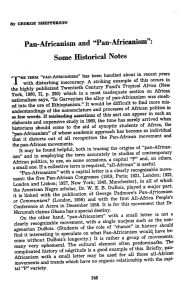The Evolution of Pan-Africanism in the United States
advertisement
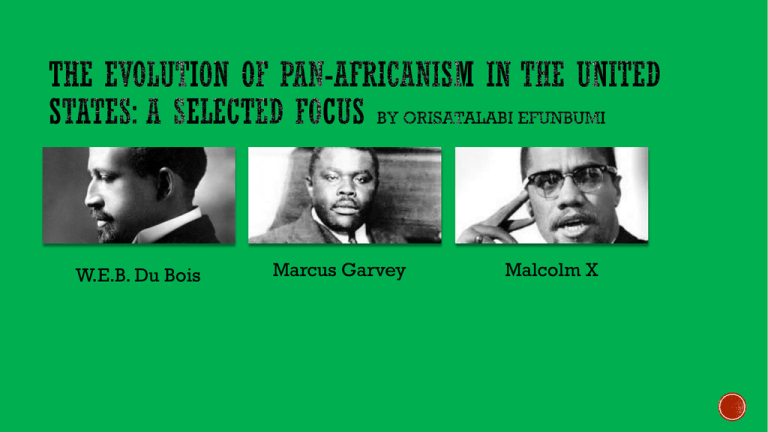
W.E.B. Du Bois Marcus Garvey Malcolm X To get a clearer academic perspective of each man’s role in the struggle of the liberation of Africans worldwide. To challenge my own opinions about and prejudices toward each man’s legacy To learn from each man’s pan-African influence for possible application to pan- African efforts today. The following definition is an excerpt from Minkah Makalani, professor of African Studies at Rutgers University: Pan-Africanism represents the complexities of black political and intellectual thought over two hundred years. What constitutes Pan-Africanism, what one might include in a Pan-African movement often changes according to whether the focus is on politics, ideology, organizations, or culture. Pan-Africanism actually reflects a range of political views. At a basic level, it is a belief that African peoples, both on the African continent and in the Diaspora, share not merely a common history, but a common destiny. This sense of interconnected pasts and futures has taken many forms, especially in the creation of political institutions. (Makalani, 2011) Notable quotes: Discrimination based simply and solely on physical peculiarities, place of birth, color of skin are relics of that unreasoning human savagery of which the world is and ought to be thoroughly ashamed. ~W.E.B. Du Bois The denial of rights and opportunities to ten million Americans of Negro descent is not only unjust and a menace to our free institutions, but also is a direct hindrance to World Peace and the realization of Human Brotherhood. ~The Crisis One thing alone I charge you. As you live, believe in Life! Always human beings will live and progress to greater, broader and fuller life. The only possible death is to lose belief in this truth simply because the great end comes slowly, because time is long. ~W.E.B. Du Bois in his last statement to the world, 1963 His Attributes and Achievements His Shortcomings and Failures He developed the science of sociology Even though resolutions condemning in America He founded the Niagara Movement (1907)--- the precursor to the NAACP (1910) He convened/participated in the 5 pan-African congresses from 1919 to 1945. He was resolute about the causes he supported and willing to change his opinions with studied insight. colonialism and oppression on African people were passed in the Pan-African congresses convened by Du Bois, little concrete action was taken. (paraphrased from NAACP History: W.E.B. Du Bois) He was perceived as bourgeois by the poor black masses. Notable Quotes: Lagging behind in the van of civilization will not prove our higher abilities. Being subservient to the will and caprice of progressive races will not prove anything superior in us. Being satisfied to drink of the dregs from the cup of human progress will not demonstrate our fitness as a people to exist alongside of others, but when of our own initiative we strike out to build industries, governments, and ultimately empires, then and only then will we as a race prove to our Creator and to man in general that we are fit to survive and capable of shaping our own destiny. UP!UP! You Mighty Race! You can Accomplish What you will! I repeat that God created you masters of your own destiny, masters of your own fate, and you can pay no higher tribute to your Divine Master than function as man, as He created you. A people without knowledge of their past and history is like a tree without roots! ~Marcus Garvey His Attributes and Achievements He co-founded the UNIA in 1914. He internationalized the vision of building an African nation. He took practical measures toward black autonomy self-sufficiency in business and community enterprises. His Shortcomings and Failures He was contentious and created enemies out of allies. He failed to delegate management of UNIA affairs to qualified leaders. He made his position and control over the UNIA more important than the Pan-African objectives of the organization. Notable Quotes: We declare our right on this earth to be a human being, to be respected as a human being, to be given the rights of a human being in this society, on this earth, in this day, which we intend to bring into existence by any means necessary. The only way we'll get freedom for ourselves is to identify ourselves with every oppressed people in the world. We are blood brothers to the people of Brazil, Venezuelan Haiti and Cuba. You're not to be so blind with patriotism that you can't face reality. Wrong is wrong, no matter who does it or says it. Malcolm X (El Hajj Malik El Shabazz) His Attributes and Achievements He founded the OAAU He was outspoken about the social, racial and political injustices experienced by African Americans. He was successful in convening the UN to hear charges against the US of crimes against humanity He legitimized self-defense as a means to stand up against racial violence. (By any means necessary) His Shortcomings and Failures He muted his aspirations for unifying and mobilizing African Americans while under the leadership of Elijah Muhammad of the NOI. His characterization of white men as ‘the Devil’ during his time with the NOI marginalized his message in the main stream media. Du Bois a Chronology: http://www.library.umass.edu/spcoll/dubois/?page_id=860 Du Bois the Activist: http://www.library.umass.edu/spcoll/exhibits/dubois/intro.htm UNIA-ACL Website: http://www.cbpm.org/unia-acl.html Quotes from Marcus Garvey: http://africanamericanquotes.org/marcus-garvey.html Malcolm X Official Website: http://www.malcolmx.com/index.html
